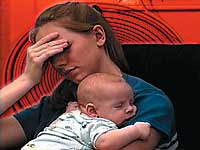How seriously do guys take teen pregnancy?
“Some of them, they like, they get a girl pregnant, they really don’t care,” says 16-year-old Dominique King. “I think most guys attitudes about it is it’s going to feel good, it’s going to be fun. I don’t think they worry about the after-effects,” adds Curtis Cotsonis, 17.
Experts say a lot of young males feel that way. “Hey, you know. If I get somebody pregnant I can walk away. And that’s a bad attitude,” explains Daniel Jean-Baptiste, an STD Prevention Educator.
And pregnancy prevention experts say changing that attitude is not easy. “It’s still very much a notch in your belt, to score for a young guy,” says Michele Ozumba, a Pregnancy Prevention Specialist with GCAP, the Governor’s Council on Adolescent Pregnancy. “It seem as if girls are the only ones who want to talk about not having sex, STD’s, not getting pregnant,” adds Jean-Baptiste.
That’s where a program like the Governor’s Council on Adolescent Pregnancy comes in. Here, male volunteers learn from pregnancy prevention specialists to become ‘teen educators’.
“They want us to spread the news to help out guys,” says 15-year-old Dontavious Cheeks.
Spreading the news, not by doing speeches or handing out pamphlets… but one conversation at a time. “When you have another teenager, who’s their age from their communities, speaks their language, so to say. They’re much more receptive,” says Jean-Baptiste. “If I’m walking down the hall with some friends of mine and hear one of them talk about sex, talk about getting a girl pregnant, talk about this that and the other thing. You know I’ll say ‘this and this could happen to you’,” says Curtis.
And experts add… the power of that peer message is multiplied when young males also get the same message at home. “Because parents are still the greatest influence on a young persons life,” says Ozumba, “Even when the parents don’t realize it.”
By Larry Eldridge
CWK Network, Inc.
Consider the following statistics gathered in a recent survey by the Centers for Disease Control and Prevention concerning teenage sexual behavior:
Half of all students have had sexual intercourse during their lifetime. Hispanic male students (63 percent) were significantly more likely than Hispanic female students (46 percent) to have had sexual intercourse.
Overall, black students (71 percent) were significantly more likely than Hispanic students (54 percent) and white students (45 percent) to have had sexual intercourse.
Nationwide, 8 percent of students had initiated sexual intercourse before age 13. Overall, male students (12 percent) were significantly more likely than female students (4 percent) to have initiated sexual intercourse before age 13.
Nationwide, 16 percent of all students had had sexual intercourse during their lifetime with four or more sex partners. Overall, male students (19 percent) were significantly more likely than female students (13 percent) to have had four or more sex partners.
Nationwide, 36 percent of all students had had sexual intercourse during the three months preceding the survey (i.e., currently sexually active). Overall, black students (53 percent) were significantly more likely than Hispanic and white students (36 percent and 33 percent, respectively) to be currently sexually active.
Among students who had had sexual intercourse during their lifetime, 27 percent had been abstinent during the three months preceding the survey (i.e., currently abstinent). Overall, male students (30 percent) were significantly more likely than female students (24 percent) to be currently abstinent.
By Larry Eldridge
CWK Network, Inc.
Open communication and accurate information from parents increase the chance that teens will postpone sex and will use appropriate methods of birth control once they begin – thus preventing teen pregnancy.
In talking with your child or adolescent, experts at the American Academy of Child & Adolescent Psychiatry say it is helpful to:
Encourage your child to talk and ask questions.
Maintain a calm and non-critical atmosphere for discussions.
Use words that are understandable and comfortable.
Try to determine your child’s level of knowledge and understanding.
Keep your sense of humor and don’t be afraid to talk about your own discomfort.
Relate sex to love, intimacy, caring and respect for oneself and one’s partner.
Be open in sharing your values and concerns.
Discuss the importance of responsibility for choices and decisions.
Help your child to consider the pros and cons of choices.
By developing open, honest and ongoing communication about responsibility, sex and choice, parents can help their youngsters learn about sex in a healthy and positive manner.










